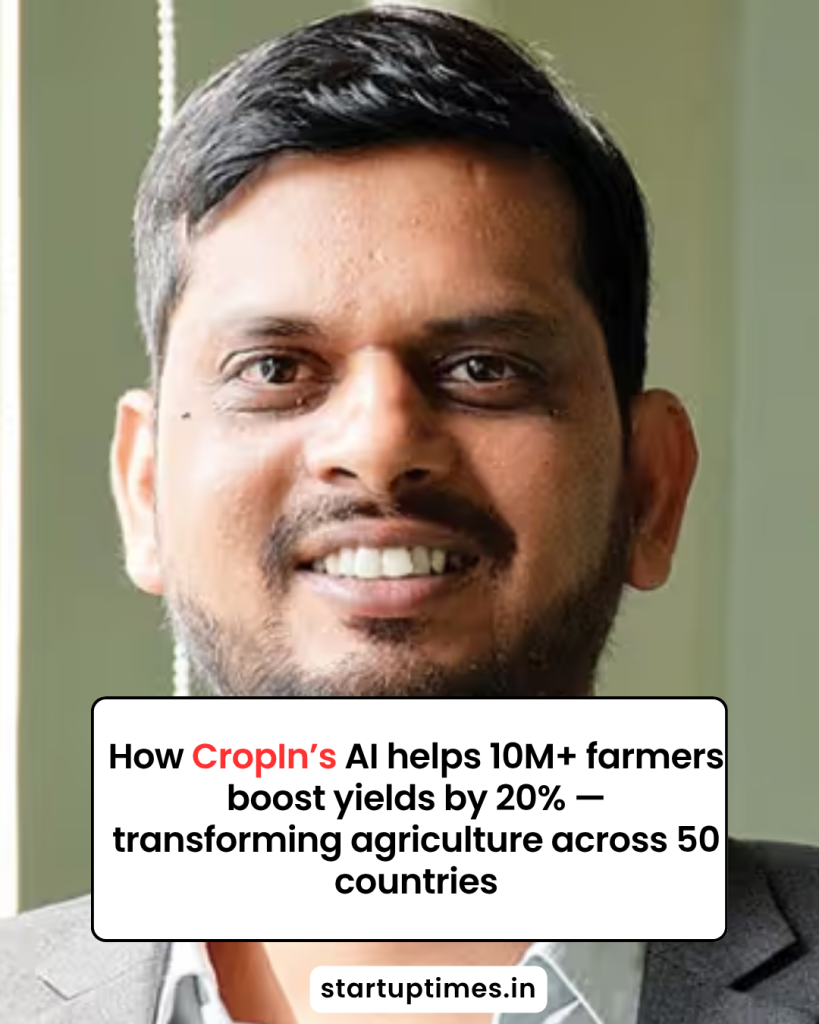When Krishna Kumar founded CropIn in 2010, Indian agriculture was at a crossroads — vast, vital, but deeply fragmented and dependent on guesswork. His vision was clear: to bring data-driven decision-making to the world’s oldest industry.
Starting small in Bengaluru, CropIn built one of the world’s first AI and data analytics platforms for farm management, helping farmers, agribusinesses, and governments digitize and optimize agricultural operations. Fifteen years later, in 2025, CropIn serves over 10 million farmers and works with 250+ agribusinesses across 50 countries, generating $50 million in annual revenue.
The company’s platform integrates satellite imagery, weather data, IoT sensors, and AI models to give farmers insights into soil health, crop performance, pest risks, and yield forecasts. By providing early warnings and actionable insights, CropIn helps farmers make smarter, more sustainable decisions — increasing yields by up to 20% while reducing input waste.
At the heart of CropIn’s technology is its SmartFarm platform, which enables real-time monitoring of farm plots, predictive analytics, and data-driven interventions. Agribusinesses use SmartFarm to track their entire value chain — from seed to harvest — ensuring transparency and traceability across the supply network.
Its SmartRisk platform, meanwhile, uses machine learning to assess climate and credit risks, helping financial institutions and insurers evaluate farmer eligibility and coverage. This innovation has opened the door to financial inclusion for millions of smallholder farmers, a game-changer in developing economies.
Krishna Kumar’s idea was not just to digitize agriculture but to make it intelligent. CropIn’s AI models process billions of data points collected from satellites, weather stations, and field inputs, building a digital twin of every farm on the platform. This allows predictive farming — where decisions are based not on tradition, but on precise, real-time intelligence.
CropIn’s global impact has expanded rapidly. From India’s rice and cotton fields to Africa’s maize farms and Southeast Asia’s plantations, the platform is being used by governments, agritech startups, food processors, and NGOs to enhance productivity, reduce waste, and promote climate resilience.
In 2021, the company raised funding from investors like Chiratae Ventures, ABC World Asia, and CDC Group (now British International Investment), helping it scale globally and invest in deep tech research.
By 2025, CropIn’s partnerships with government bodies and agri-enterprises have led to the creation of digital farm records for over 25 million acres of land, providing data transparency and efficiency across the food supply chain.
CropIn’s success is a testament to how technology can uplift traditional industries. Its work in climate-smart agriculture helps farmers mitigate risks from unpredictable rainfall, rising temperatures, and soil degradation — key issues in the era of global warming.
The company’s next big step focuses on AI-powered sustainability, enabling carbon tracking and regenerative farming practices to help agri-enterprises meet global ESG goals.
For Krishna Kumar, CropIn’s journey has always been about empowerment — not disruption. “Our goal is to make every farm a smart farm,” he said in a recent interview. And with millions of farmers already connected to its network, that vision is rapidly becoming reality.
In a world facing food security and climate challenges, CropIn’s model proves that data is the new fertilizer — and that digital intelligence can grow not just crops, but rural prosperity.

Last Updated on Saturday, October 25, 2025 11:39 pm by Startup Times
